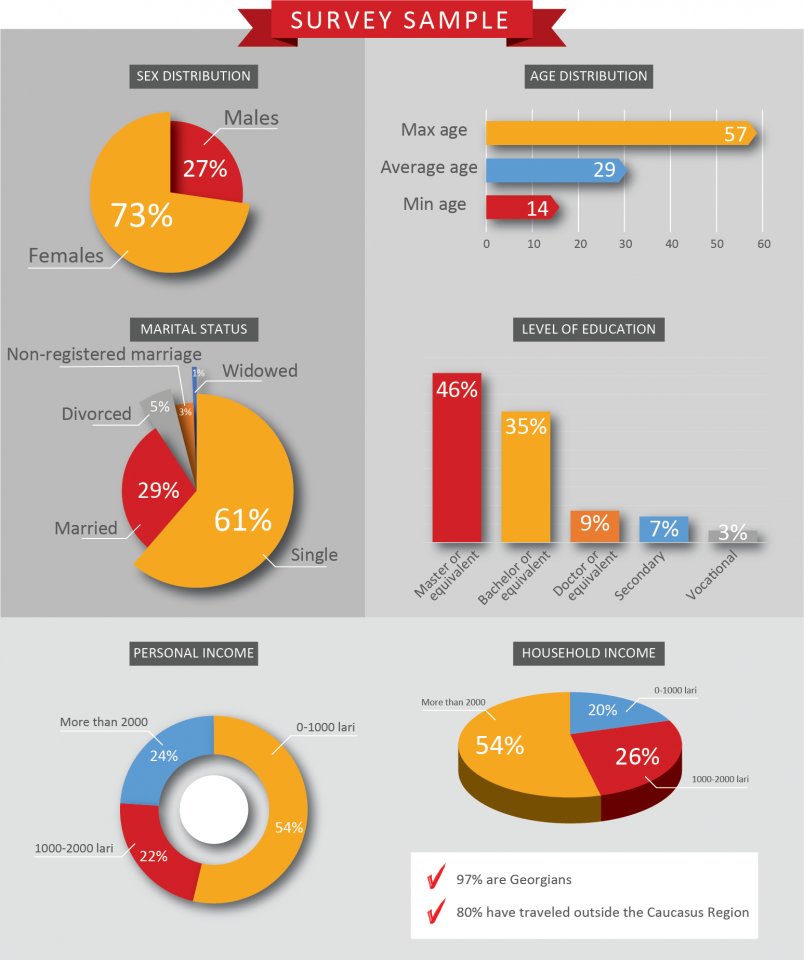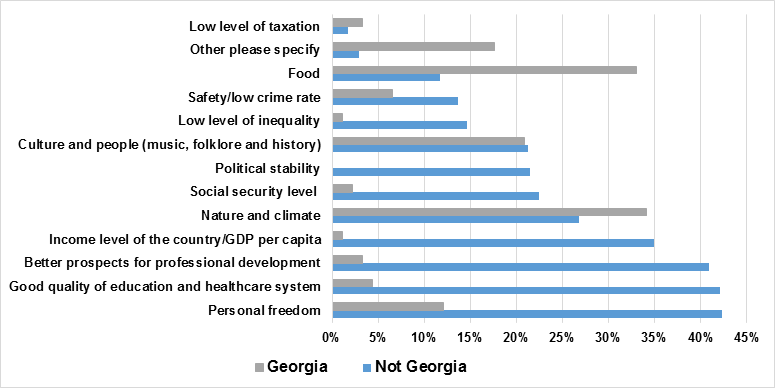 30
June
2022
30
June
2022
ISET Economist Blog
 Monday,
10
April,
2017
Monday,
10
April,
2017

 Monday,
10
April,
2017
Monday,
10
April,
2017
Note: Countries in red and yellow are the ones where respondents of the survey would like to be born. The first 11 countries in the ranking are in red, the rest in yellow. Countries in light gray were not mentioned at all.
The ISET team conducted an online survey that began with the following question: if you could choose where to be born, what country would you pick? We intentionally formulated the question in this way, which is very different from asking “where would you like to travel or to migrate?” This formulation was meant to allow us to look into characteristics of countries to determine which ones individuals find interesting and appealing if a veil of ignorance is added about their initial standing in the society (e.g. in family and/or social class status at birth). One might argue that respondents do not think too much about all the implications when choosing a country in which to be (re)born. Still, we believe that one can learn something interesting from this exercise.
The survey was conducted using a questionnaire written in Georgian, through Facebook, in March 2017. Our respondents’ characteristics are provided below. Our sample is not representative of the whole country because of the chosen channel, but the answers provided are nevertheless quite interesting. The survey was filled mainly by young individuals (with an average age of 29 years), of which more than 70% were female. Our respondents have a relatively high education level and are relatively wealthy. 97% of them are Georgians, and 80% have traveled outside of the Caucasus region. A total of 501 individuals responded.

It is interesting to observe that only 18% of respondents picked Georgia (the number one choice) as their country of birth.
The top ten countries following Georgia, in respondents’ order of preference, are: USA, Italy, UK, Germany, Switzerland, Norway, Sweden, France, Netherlands, and Spain. These are all developed countries and are all in Western Europe, with the exception of the USA. In total, respondents named 39 countries, of which only 12 were in Asia or South and Central America. Only one respondent reported that he would like to be born in Russia. All the countries mentioned are shown on the map above in red (top 10 + Georgia) or in yellow (the rest). Curiously, two respondents named a specific location inside Georgia (Zugdidi and Tusheti); two other respondents reported that they would like to be born in Camelot, and in another galaxy.
Apart from a common preference for Georgia and the USA (at the top of the ranking), males and females seem to have quite different preferences: Italy ranks third for Georgian females, while it is ninth for males; France, Spain and Canada appear in females’ rankings, but not for males, while the Netherlands, New Zealand and Iceland appear in males’ rankings, but not in females’ preferences.
Table 1. Ranking of the country of birth by gender
| Ranking | Females | Males |
| 1 | Georgia | Georgia |
| 2 | USA | USA |
| 3 | Italy | Switzerland |
| 4 | UK | Norway |
| 5 | Germany | UK |
| 6 | Sweden | Germany |
| 7 | Switzerland | Netherlands |
| 8 | Norway | New Zealand |
| 9 | France | Italy |
| 10 | Spain | Iceland |
| 11 | Canada | Sweden |
Reasons for choosing a country:
After asking our respondents to name a country, we asked them to name the top three reasons for their choice. Our respondents can be aggregated in two very different groups:
Segment 1 – People who would choose to be born in Georgia (18% of the sample). The top three reasons stated by individuals in this segment are: (i) nature and climate (mentioned by 34 % of respondents); (ii) food (33 %) and (iii) culture and people (21%). These categories summarize well what Georgians love in their country. In hindsight, we wish we had included wine as a special category to denote its significance for Georgians, separated from all other food and cultural aspects. When choosing the “other” option, respondents note that they simply love their home country and would want to live here (again).
Segment 2 – People who would choose to be born in a country different from Georgia (82% of the sample). The top three reasons stated by this segment are: (i) personal freedom (named by 42% of respondents); (ii) good quality of education and healthcare (42%) and (iii) better prospects for professional development (41%).
Figure 1 Reasons of choosing a country for respondents choosing Georgia and the rest

Georgians are usually perceived as “traditionally minded,” so we did not expect to observe such a high ranking of the “personal freedom” motivation to be born in another country (the number one reason, actually). The result, however, looks much less surprising once we remember that our sample is comprised mostly of relatively young, well-educated, and wealthier individuals with some travel experience.
There are also some differences between male and female respondents, as it can be seen in Table 2. Both males and females rank personal freedom and better prospects for professional development in the top two positions. However, for females, these two reasons come after the presence of good quality education and healthcare systems in the destination country, which can be associated with better prospects for personal development and, possibly, a better quality of life (given a certain level of income). Also, the difference in the third rank confirms this gender difference, with men focusing on the GDP per capita of the receiving country, and women mentioning nature and climate.
Table 2 Top three reasons for choosing a country for males and females
| Ranking | Males | Females |
| 1 | Personal freedom – 49% | Good quality of education and healthcare system – 36% |
| 2 | Better prospects for professional development – 38% | Better prospects for professional development and Personal Freedom – both 33% each |
| 3 | Income level of the country/GDP per capita – 36% | Nature and climate – 27% |
Other interesting reasons stated by respondents were very “country-specific”: football (for those choosing Spain or Argentina), handsome men (Italy) and beautiful women (Iceland), tolerance towards LGBT community (Czech Republic), beer (Germany), name of the country (Nepal).
Marital status seems to affect the ranking of choices to only a limited extent. Married individuals tend to choose Georgia more compared to unmarried ones (23% vs 16%), and to prefer countries that are “closer” to Georgia. Overall, however, for most individuals (married or not) the top choices outside Georgia are the USA and Western Europe.
In order to see how “good” our respondents’ preferences would look to an objective observer, we compared our survey results to the Where to Be Born Index (WTBBI) calculated by the Economist Intelligence Unit (previously called the quality-of-life index, abbreviated QLI). This index attempts to measure the opportunities for a healthy, safe and prosperous life provided to its citizens. It is based on a method that links the results of subjective life-satisfaction surveys to objective determinants of quality of life. The latest ranking available is from 2013.
| Our sample rank | Where to be born Index rank | |
| USA | 2 | 16 |
| Italy | 3 |
21 |
| UK | 4 | 27 |
| Germany | 5 | 16 |
| Switzerland | 6 | 1 |
| Norway | 7 | 3 |
| Sweden | 8 | 4 |
| France | 9 | 26 |
| Netherlands | 10 | 8 |
| Spain | 11 | 28 |
Our statistical analysis of the data confirms what can be easily seen just by looking at the table: our sample choices differ substantially from the ranking according to the WTBB index, with a bias towards Western Europe and the USA. Surprisingly, some very successful Asian countries which are very highly ranked in the WTBB index, like Singapore (#6), Hong Kong (#10) Taiwan (#14), do not appear in our sample choices at all. On the other hand, some countries which are more familiar to Georgians, and to which Georgians feel closer, like France, Germany, Italy, the UK, and Spain, perform better in the minds (and hearts) of Georgians than the index would suggest. Country choice, therefore, seems to be affected to a large extent by the perceived degree of “geographical and/or cultural proximity” more than from purely economic considerations.
These are the preferences of our respondents. We are very thankful to them for giving us the opportunity to analyze this very interesting data and providing some interesting insights about the attributes they value in a country.





